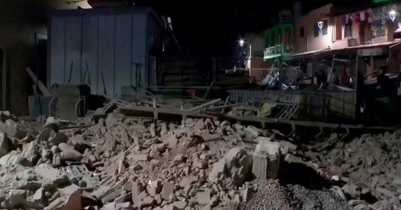Japanese moon landing spacecraft likely crashed, says ispace

A small, privately-funded Japanese spacecraft attempted to land on the moon Tuesday, but flight controllers in Tokyo lost contact with the craft during the final minutes of its descent when it apparently ran out of fuel and crashed to the surface in a "hard landing."
"We have not been able to confirm (a) successful landing on the lunar surface," said Takeshi Hakamada, founder and CEO of ispace, the company that launched the mission.
"Our engineers at (mission control) continue to investigate the current status of the lander," he said. "Currently, we have not confirmed communications from the lander. ... So we have to assume that we could not complete the landing."
Launched last December atop a SpaceX Falcon 9 rocket, ispace's Mission 1, or M1 spacecraft, slipped into an initially elliptical orbit around the moon on March 21. Thruster firings then put the craft in a circular orbit at an altitude of about 62 miles.
At about 11:40 a.m. Tuesday, the probe's AI-enabled flight computer fired thrusters to slow down and drop out of orbit, kicking off an hourlong descent to a planned touchdown on the floor of a 54-mile-wide crater named Atlas.
The spacecraft appeared to be performing normally, at least up to the last few minutes of the descent when contact was interrupted. At that point, the probe apparently was descending at about 21 mph as it passed through an altitude of 300 feet.
The expected time of landing then came and went, with no confirmation of touchdown or any other data from the M1.
Television cameras caught worried expressions in the mission control room as engineers monitored computer displays, looking for signs of life. After several more minutes, the livestream cut away to recorded video with the commentator's promise to provide updates as soon as possible.
Finally, after about 25 anxious minutes, Hakamada announced contact had not been restored and the mission was presumed lost. It was the second non-government lander to fail during descent to the moon after an Israeli spacecraft named Beresheet crashed in 2019.
Hakamada thanked ispace engineers, technicians and their families, saying "we are very proud of the fact that we have already achieved many things during this Mission 1 and that data will be fed into the company's upcoming lunar missions."
"We will keep going, never quit in (our) lunar quest," he said.
Read More
- Dubai-bound flight catches fire after taking off from Nepal
- Turkey`s homegrown 5th-generation fighter jet named KAAN
- Shihab Chottur reaches Makkah from India in 12 months
- Eid Ul Adha 2023 in Saudi Arabia!
- Italy will take 82 thousand workers, the is in March
- World`s first 3D-printed mosque to be constructed in Dubai
- India gets new parliament building
- Karnataka: Modi invokes `The Kerala Story` to target Congress
- Imran Khan likely to be in custody for ‘4 to 5 days’
- Two Sylheti killed in Portugal






























